10 Ways You Can Tell Billings-United is a Fake Vehicle Escrow Scam
Anatomy of used car scams, how to avoid getting ripped off
Many of you who know us are aware that for over a decade we have investigated all sorts of on-line fraud, particularly vehicle escrow fraud and phony car ads. We have been investigating this latest fraud site known as Billings-United.com after receiving complaints from visitors here on CarBuyingTips.com in February.
Like many before we investigated and discovered the scammers behind this fraud currently have several classic car ads running all over the Internet, on Craigslist, Autotrader, Vette Hound, and probably many more.
During our investigation last month, we found over a dozen victims signed up on their not so secure escrow web site and warned all of them. We managed to save all but 2 victims who sadly had already wired off $20,000 to these Russian scammers, and lost it all. We then broadcast about it on-line to warn others, and ruined their use of the bank account they were using.
How these fake vehicle classified ads work
When you contact the "seller" they respond back with a scripted letter that suggests you escrow the payment of the car through Billings-United. But unknown to you, the seller is really a Russian scammer who put up that fake escrow site and is about to rip you off by tricking you into thinking that fancy site is a real trusted third party escrow. We'll show you the red flags that should be obvious to you, but many victims here tripped over 10 possible red flags and missed them all!
99% of all escrow sites are fake
That's right folks, there are so many fake escrow web sites out there, that it's a nightmare for the average person to tell which ones are real and which are fake. We'll show you below, plus you can read more details on our Guide to Avoiding Internet Fraud. I know in the past eBay had recommended Escrow.com, they are registered in most states, and that's really the key, you should confirm a site is registered otherwise they are a fraud.
We found at least these 3 non-existent classic cars were being listed for sale and buyers told to use Billings-United
- 1951 Chevrolet 5 Window pickup truck for $19,900
- 1969 Dodge Charger 500 $19,900
- 1967 Chevrolet Corvette for $25,800
That 1967 Corvette above is arguably worth $50k or more, just check listings on eBay Motors, and that Dodge Charger is worth $25,000 or more, some over $50,000. See the pattern here? Think with your brain not the foam coming out of your mouth when you see a car listed for thousands less than it is worth, no matter what bogus story of desperation they give you when you ask why are they selling it so low.
Let's pick apart this real life scam and look for the red flags that could have saved our victims $20,0000. Here's our list of 10 ways to tell an escrow site is a fraud. You almost want to laugh and cry at the same time, because these are so obvious.
1) There's a dash in their domain name, i.e. Billings-United.com
Below is a screen shot of this scammer site. It looks pretty professional. But once the dazzle of the flashy site wears off, you'll notice a few red flag items that should have saved some people from losing all their money to our vodka guzzling Russian friends to the east.
First of all, there's a dash in the name. Most people would not give that a second thought. However, most legitimate businesses don't have a dash in their name. Why is this significant? Over the years, the scammers have created literally thousands of fake escrows, and they all get shutdown when it hits the fan. Now this site could go down at any time, but not to worry, I have a screen shot below for you.
So all the good ".com" names are taken, and these scammers have resorted to using dashes in the name as they create one phony escrow site after another. Think about it for a minute, focus on all the major sites you know and trust, how many have a dash in their name? So that should be your first red flag.
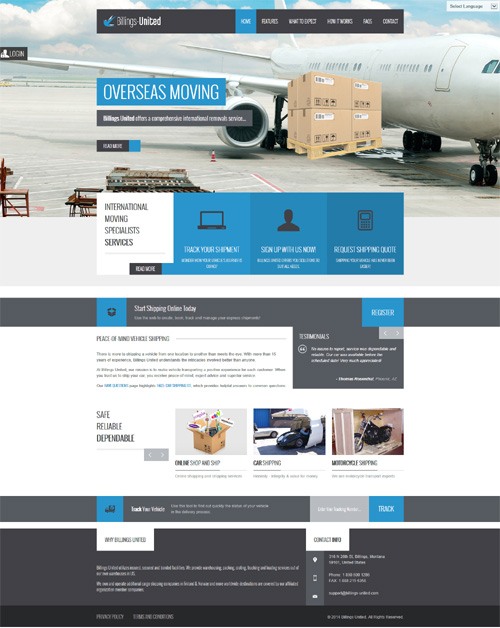
2) Fake mailing address and phone number
This is actually quite funny. We looked at their web site in February and we always Google the alleged mailing address. You should too, because 30 seconds of work just saved you $20,0000. In this case, they used the mailing address of the courthouse in Billings Montana! How poetic.
Once we made the public announcement on Feb 28 that we cracked their site and exposed their dirty deeds, they panicked and scrambled to change the address on their site, and as of March 1, the new address on their web site points to a graphic T-shirt design house, or something similar.
See the screen shot we took below on 2 different dates showing how they changed the address. Also their fake phone number, when you call you'll never talk to a human, ever. Some victims told me that one person claiming to be from Billings-United called them back to ask why haven't they wired the money yet. They said he sounded Russian or Eastern European. No... you think?
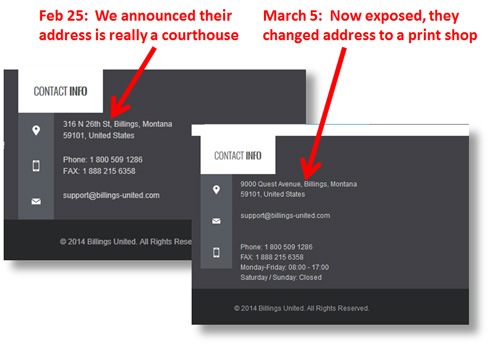
3) The web site is barely a month old
This is very typical of these scams, and if the victims would only run a quick WHOIS lookup on the web site domain name they would see instantly that the site is usually only a week old by time they are scheming and scamming. That's hardly an established financial company and is your most powerful red flag on this list. See the screen shot we made below from the WHOIS lookup of the Domain Name Record at CentralOps. Also the domain name is hosted in the Ukraine. Not what you would expect from a U.S. based company. All this information we just pointed out to you can be obtained in 5 minutes on every site in the world.
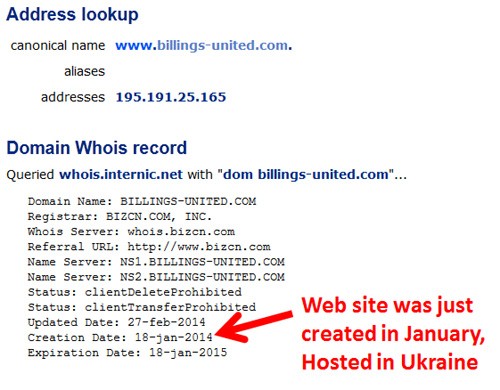
4) Selling price of the used car is too good to be true
Too many victims are lured in by the suspiciously lower than normal, too good to be true price. As soon as people hear that low price for a car that's clearly worth much more than that, their brains shut down. It's funny they'll spend more time in front of the Red Box DVD rental at the grocery store picking a movie than they will looking into a company who is about to take $20,000 from them. The laws governing escrows are strict and they must be registered with the state.
5) Not registered with the Better Business Bureau or State Department of Corporations
Any legit company, especially one dealing with finances should be on file with the BBB.com. If you can't find them there with an A rating, don't deal with them. Also look the "company" name up on the state's corporations web site, they must be listed there. If not, you know it's a fake.
6) The site is not secure, no https
One of the dead giveaways is the site is not secure, meaning when you look at the URL address in the browser, it says http: which means NOT secure, instead of https: which means secure. Any financial site like that where you must sign in and execute secure transactions you have to use secure site protocols.
It takes less than 1 second to confirm for yourself. Also, next time you login to eBay or PayPal, you'll see the login screen pages are all secure starting with https:, because they are legit sites.
7) Wiring instructions list a fake person or company and bank in another state
Below is a screen shot we got from an actual victim who received these wiring instructions from the fake escrow. If people would just use a bit of common sense here and lookup the ABA Routing number listed there, they will see it goes to a bank in NC. Now doesn't that sound strange to you that the funds are not going to a bank in the home state of the alleged company? Also the company listed is "Atora Solutions LLC." The real Atora people probably have no idea their name was being used here I'm sure.
On wiring instructions, you can have it say Mickey Mouse as the beneficiary of the funds transfer and the funds will still get there with the routing number and account number. The business name is just a smoke screen. In fact, last month we brought their previous account at Bank of America to a screeching halt, and they had the name of some lady in Chicago as the person receiving funds! So how do victims fall for these absurd little bits of info that were right in front of their faces? It's almost as if the Russians are directly telling you I'm stealing your money.
I think federal laws need to be changed to require the exact match of beneficiary on a wire transfer so that we will see who it is really going to and people cannot launder money overseas which is what is happening here.
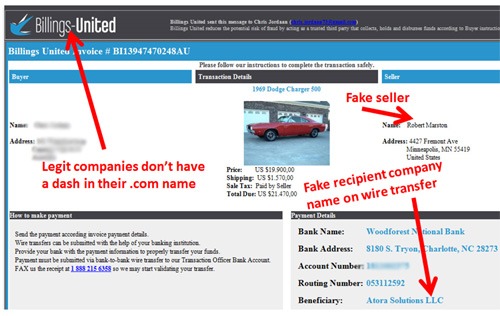
8) Google the name of the web site
It's just that simple. Google the escrow name with and without the .com and see if there's reports of it. Hopefully you're not the first victim. These Russian scammers are getting more inventive too. They know we are searching their name on-line in Google, and so they have gone into sites like Yahoo Answers and post stupid questions like "anyone know where I can get a good car shipping company?" Then another person with the "answer" says "why yes, I used Billings United..."
It's so obvious they are trying to create several phony positive reviews to show up in Google so that you will see it when you search for information about the site. These guys are getting crafty, but of course they don't fool me and now they won't fool you either.
9) There's no way for you to see the car before sending money
We have seen these scammers come up with all sorts of reasons why you can't see the car first. They are in the army and stationed out of the country and can't get at it now, it's locked up in the warehouse. Or they tell you the escrow company will let you inspect it once you wire the money to secure the sale. All of these are tricks to keep you from seeing a car that is not there. In fact, they usually steal the ads from previous listings.
Hey my Russian comrades, welcome to America, but in our country, we look before we send money, you don't get one cent until we inspect the car first, not to you, no to an escrow. Even eBay recommends you use an inspection company to go look at the car for you and report back what they saw. Craiglist tells you at the top of every single ad to deal locally, so you can see the item.
10) Google the car's VIN#
This is not fool proof, but quite often we will Google the VIN# they provide off the car and you'll see other ads floating around, or maybe you'll discover the car ad was stolen and the car was sold weeks before by a real seller to a real buyer. Often these scammers like to steal previously run ads from car dealers, so see if the ad appears anywhere else.
Don't ever use the escrow company recommended by the "seller"
The fact that the sellers say "my wife used them last year and they are trustworthy" means you should run for this is a scam and there is no car really for sale. Tell them you want to use Escrow.com who is one of the few who are legit, and see the excuses start piling up as to why they can't use them. Also if anyone tells you to pay by Western Union or Moneygram, run don't walk away from the deal. Don't ever use instant cash services like these to pay for something online unless you know and love the person who the money is going to.
Don't reply back to them, just move on, and always be sure to flag their ad on Craigslist, or Autotrader, wherever you see them. That's how you fight these scammers, by cutting off the source of their income, the ads, and nipping it in the bud from the start by getting their ads shut down. Don't worry about flagging the wrong ad, the classified sites know what they are doing and they know how to determine the ad is fake, just leave it to them.
Please let everyone you know about this, particularly friends who are buying used cars on-line. Also, if you suspect a rotten apple of a car listing, let us know about it ASAP and we'll look into it right away. Please post your comments and questions below.
Good luck out there and be careful!
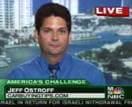
About The Author: Jeff Ostroff
A lifelong consumer advocate with over 20 years of unparalleled expertise, Jeff is the Founder, CEO and Editor-In-Chief of CarBuyingTips.com. As chief consumer advocate, he oversees a team of experts who cover all aspects of buying and selling new and used cars including leasing and financing.
For decades, Jeff has been the recognized authority on vehicle purchasing, sought out often by the media for his decades of experience and commentary, for live call-in business radio talk shows and is cited often by the press for his expertise in savvy car shopping methods and preventing consumer scams and online fraud. Jeff has been quoted in: CNN, MSNBC, Forbes, New York Times, Consumer Reports, Wall Street Journal and many more.
Jeff also has extensive experience and expertise in new car brokering and selling used cars for clients on eBay and Craigslist. Connect with Jeff via Email or on Twitter.







